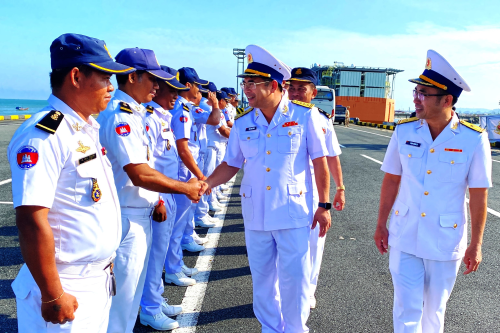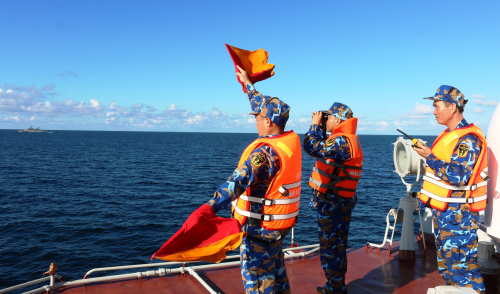Strengthening ideological education to enhance awareness, focusing on thorough preparations to meet all diplomatic requirements, closely integrating with other operational aspects, and actively innovating the content and methods of activities are the fundamental principles of defence diplomacy. These principles are being prioritised by the Naval Region 5 Party Committee and Command, with comprehensive and appropriate measures to create favourable conditions for firmly safeguarding the sovereignty of the Southwestern maritime and island area of the Fatherland.
The Naval Region 5 is responsible for managing and firmly protecting the sovereignty of the waters stretching from the Ganh Hao estuary in Bac Lieu province to Ha Tien in Kien Giang province. This area encompasses more than 150 large and small islands and shares maritime borders with Cambodia, Thailand, and Malaysia. This maritime region holds strategic significance in terms of economics, politics, national defence, security, and foreign relations for both Southern Viet Nam and the entire country. Being fully aware of this vital responsibility, in recent years, the Naval Region 5 Party Committee and Command have proactively overcome challenges, implemented comprehensive measures, and successfully fulfilled their key political missions. Among these, defence diplomacy has been identified as a crucial and regular task, receiving focused leadership, direction, and execution. In practice, the Region has conducted in-depth research, invested resources, and prioritised the implementation of this key task through various practical and effective measures. One of the most notable achievements has been the establishment and strict implementation of joint patrol coordination mechanisms with the Royal Cambodian Navy and the Royal Thai Navy. Additionally, the Region has effectively maintained a hotline communication channel, enabling timely information exchange, coordination in search and rescue missions, and resolution of emerging issues at sea.
 |
| Naval Region 5 delegation work with Ream Naval Base of the Royal Combodian Navy |
In 2024, the Region successfully conducted three joint patrols with the Royal Cambodian Navy and two joint patrols with the Royal Thai Navy. It also coordinated with the Ream Naval Base of the Royal Cambodian Navy to organise successful joint patrol review conferences. Furthermore, the Region actively advised and successfully fulfilled its role in delegations accompanying the Commander of the Navy on visits and working sessions with the Royal Cambodian Navy, as well as participating in the fourth bilateral naval consultation conference in Thailand. These efforts have significantly contributed to enhancing mutual trust and understanding between the Naval Region 5, the Navy as a whole, and the naval forces of neighbouring countries, fostering a stable, peaceful environment in the Southwestern maritime and island area of the Fatherland.
In the coming time, while situation in the Southwestern maritime region is expected to remain largely stable, many complex, sensitive issues persist, with unpredictable factors that could lead to instability and directly impact the mission of managing and protecting Viet Nam’s maritime sovereignty. Given this context and based on the experience and achievements, the Naval Region 5 Party Committee and Command have determined to further strengthen leadership and direction in advancing defence diplomacy through comprehensive, decisive measures, focusing on the following key aspects:
First, it is necessary to enhance education to promote awareness and responsibility of officers and soldiers for defence diplomacy, ensuring unity and consistency in both ideology and action while carrying out this crucial task. The Naval Region 5 is responsible for managing and protecting the strategically important Southwestern maritime area, an area connected to multiple territorial waters and naval forces of neighbouring countries and fraught with challenges. Thus, effective implementation of defence diplomacy holds even greater significance. With this understanding, the Region requires its agencies and units to innovate the content, methods, and forms of education. The focus is on thoroughly popularising the Party’s foreign policy, clarifying the position and role of defence diplomacy amid deepening international integration, and grasping resolutions, conclusions, and plans from higher authorities, as well as the Party Committee of the Region’s resolutions on defence diplomacy. Additionally, efforts are being made to enhance education on cultural understanding and to keep military personnel updated on the military and naval forces of relevant countries. Officers and soldiers are also being trained on regulations and guidelines related to diplomatic activities, ensuring strict adherence to the laws of host nations and international law. Officers and soldiers are expected to uphold the qualities of “Uncle Ho’s Soldiers - Naval Warriors,” maintaining the honourable image of Viet Nam, its people, the People’s Army, and the People’s Navy in the eyes of international friends. To deeply ingrain these principles into the ideology, willpower, and actions of officers and soldiers, especially those directly involved in diplomatic missions, the leadership at all levels integrates educational programmes with the practical realities of defence diplomacy and joint patrol duties. As a result, officers and soldiers develop a profound understanding of the objectives, perspectives, and guiding principles of the Party, State, and military regarding international integration and defence diplomacy. They fully grasp the “Vietnamese bamboo diplomacy” philosophy, which remains steadfast in principles while demonstrating flexibility, adaptability, and diplomatic tact in international relations. This is particularly vital in managing interactions at sea with foreign navies, strictly adhering to the principles of being “proactive, active, firm, flexible, and effective.” Such an approach helps minimise disagreements, avoid confrontation in resolving disputes and hotspots, control risks of maritime conflicts, and maintain a stable, peaceful environment in Viet Nam’s Southwestern maritime territories, islands, and continental shelf.
 |
| Conducting joint patrol with the Royal Thai Navy |
Second, there is a need to make good preparation to meet the requirements of defence diplomacy. The Naval Region 5 Party Committee and Command emphasise the importance of selecting and preparing personnel for defence diplomacy tasks. The leadership prioritises reviewing political qualifications and carefully selecting officers, soldiers, and technical personnel who demonstrate exceptional capability, good health, and strong discipline. Priority is given to individuals proficient in foreign languages and military expertise to participate in defence diplomacy missions and joint patrol operations. At the same time, the Region requires its forces to maintain close coordination with navies of neighbouring countries in formulating plans, accurately predicting scenarios, and developing response strategies in accordance with the Party’s policies, international norms, and legal frameworks. Special attention should be given to organising training programmes on diplomatic protocols, improving competency in foreign relations, and reinforcing procedural discipline and etiquette, especially for those directly involved in diplomatic activities. Before deploying for missions, unit leaders closely monitor and manage the psychological well-being of participating soldiers, ensuring their readiness and motivation. They conduct emulation movements to inspire commitment among officers and soldiers, encouraging them to embrace and successfully fulfill their assigned duties. Furthermore, leadership places strong emphasis on logistical preparedness, ensuring sufficient supplies of food, fuel, and medical provisions for each joint patrol mission. The quality of meals and food safety standards for naval vessels are enhanced, while medical teams are strengthened to handle emergencies at sea and provide medical check-ups and treatment to foreign counterparts as assigned. Comprehensive preparation of vessels, vehicles, spare parts, life jackets, anti-sinking and fire-fighting equipment is ensured, guaranteeing absolute safety for personnel and ships under all conditions. Logistics and technical support for joint patrol missions are integrated with emergency response drills, ensuring the swift deployment of vessels when required.
Third, it is important to closely combine defence diplomacy with other operational aspects and flexibly apply content and forms of defence diplomacy. Essentially, the defence diplomacy of the Viet Nam People’s Navy is about managing relationships with foreign navies to foster a peaceful environment, thereby strengthening national defence, safeguarding the Fatherland from afar, and contributing to enhancing defence capabilities. To ensure that defence diplomacy is truly effective, properly oriented, and maximally beneficial to the nation, the Naval Region 5 will continue strengthening the leadership and direction of party committees and commanding officers at all levels in this crucial task. The Region will strictly uphold diplomatic procedures at all levels, adhering to the principles and guidelines of the Party and State, as well as international norms and conventions. In the short run, the Region will maintain established communication channels, hotlines, and regular telephone exchanges with the Region 1 and Region 2 of the Royal Thai Navy and the Ream Naval Base of the Royal Cambodian Navy. It will also collaborate with foreign naval forces according to established protocols to implement joint patrol plans. During these missions, the Region requires its forces to integrate joint patrol operations with coordinated training exercises on search and rescue, flag signaling, and the practice of using the Code for Unplanned Encounters at Sea (CUES) among Western Pacific naval forces. Additionally, the Region will enhance cultural and sports exchanges, as well as extend greetings and congratulations on major holidays and national anniversaries. These activities will help strengthen solidarity, mutual understanding, trust, and respect between naval forces, reflecting a spirit of noble and transparent international cooperation, particularly with the Royal Cambodian Navy and the Royal Thai Navy. In 2025, the Region will focus on successfully completing four joint patrol missions with the Royal Cambodian Navy and two with the Royal Thai Navy. It will also participate in the 35th and 36th joint patrol review conferences and organise the 15-year anniversary of the twinning relationship between the Naval Region 5 and Ream Naval Base of the Royal Cambodian Navy. These efforts will further build trust and mutual understanding, ensuring continued peace and stability in maritime and island areas. They will also serve to promote Viet Nam’s image, culture, and people, thereby elevating the country’s international standing and enhancing the prestige of the Viet Nam People’s Army and Navy in the global arena.
Furthermore, the Naval Region 5 Party Committee and Command will conduct thorough leadership and oversight of inspections, evaluations, and reviews of defence diplomacy efforts. This will help draw valuable lessons for future improvement. Additionally, outstanding units and individuals will be recognised and rewarded, while violations will be strictly addressed. These measures will create a strong foundation for further improving defence diplomacy efforts, guided by the principles of being “proactive, active, firm, flexible, and effective.” Ultimately, these efforts will contribute to safeguarding the Socialist Republic of Viet Nam from afar.
Senior Colonel TRINH XUAN TUNG, Commander of Naval Region 5